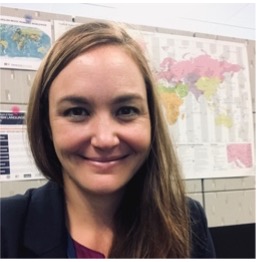Plenary Speakers
Regine Hampel
Disruptive technologies: Computer-mediated communication in language learning and teaching
Abstract: Today’s digital media offer a range of new affordances which are particularly useful in the context of language learning and teaching. They include multiple communication channels, a choice of different modes, access to speakers of the language, ubiquitous learning in the wild and the use of artificial intelligence. However, these developments are also impacting on traditional ways of meaning-making, and require the development of multiliteracies (Kalantzis & Cope 2021). This presentation will focus on the disruptive and transformative effect that the new online technologies are having on language learning and teaching (Hampel 2019). Using a theoretical framework that combines complex systems theory with sociocultural theory and the theory of multimodal communication will allow me to conceptualize the language classroom (understood in the widest sense) as an ecosystem consisting of different parts (Larsen-Freeman & Cameron, 2008), where learners interact using different modes in new ways (Kress & Van Leeuwen, 2001; Jewitt, 2014). I will end by looking at the practical implications for learners and teachers, using Larsen-Freeman & Cameron’s ‘What if?’ questions.
 Dr. Regine Hampel is Full Professor of Open and Distance Language Learning at the Open University. As Associate Dean (Research Excellence) she leads the research activity in the Faculty of Wellbeing, Education and Language Studies and oversees the faculty’s submission to REF 2021, the UK’s Research Excellence Framework. Her research focuses on the use of digital technologies for language learning and teaching, contributing to new theoretical and pedagogical perspectives that go beyond narrow cognitive approaches and take account of sociocultural theories of learning and ecological principles as well as the multimodal nature of the new media. She is particularly interested in the affordances of the online tools available today and the potential they offer for learner interaction, communication and real-world learning, as well as the implications for task design, online teaching skills, and new literacies. Professor Hampel’s work has fed into a wide range of publications, presentations and other activities, including a recent monograph entitled Disruptive Technologies and the Language Classroom: A Complex Systems Theory Approach (Palgrave Macmillan) and a recently launched book series – New Theoretical Perspectives on Technology and Language Learning (Castledown). She is on the Editorial Boards of Language Learning & Technology and ReCALL and regularly reviews for a range of journals (including ReCALL, Language Teaching, Applied Linguistics, Language Learning & Technology, CALICO Journal and CALL) and book publishers. Read more about Dr. Regine Hampel here
Dr. Regine Hampel is Full Professor of Open and Distance Language Learning at the Open University. As Associate Dean (Research Excellence) she leads the research activity in the Faculty of Wellbeing, Education and Language Studies and oversees the faculty’s submission to REF 2021, the UK’s Research Excellence Framework. Her research focuses on the use of digital technologies for language learning and teaching, contributing to new theoretical and pedagogical perspectives that go beyond narrow cognitive approaches and take account of sociocultural theories of learning and ecological principles as well as the multimodal nature of the new media. She is particularly interested in the affordances of the online tools available today and the potential they offer for learner interaction, communication and real-world learning, as well as the implications for task design, online teaching skills, and new literacies. Professor Hampel’s work has fed into a wide range of publications, presentations and other activities, including a recent monograph entitled Disruptive Technologies and the Language Classroom: A Complex Systems Theory Approach (Palgrave Macmillan) and a recently launched book series – New Theoretical Perspectives on Technology and Language Learning (Castledown). She is on the Editorial Boards of Language Learning & Technology and ReCALL and regularly reviews for a range of journals (including ReCALL, Language Teaching, Applied Linguistics, Language Learning & Technology, CALICO Journal and CALL) and book publishers. Read more about Dr. Regine Hampel here
Carolyn Penstein Rosé
Technologies for Monitoring and Support for Discussion as a Key Learning Process for SLL and Beyond
Abstract: Discussion is a key learning activity for second language learning as well as a key learning process across domains of learning. This talk focuses on discussion based learning processes and how they connect with motivation, engagement, and learning in online settings. This talk explores the costs and benefits of social interaction in online communities, what we have learned about what works, what can be done with technology, and what questions we still need to answer. In particular, this talk highlights social analytics as an area of Artificial Intelligence that plays a role in supporting education that has featured in movements towards large scale learning opportunities, such as promised in Massive Open Online Courses (MOOCs) as well as in more traditional Computer-Supported Collaborative Learning environments. It will review the history of the rise and fall of the MOOCs in connection with developments in AI in Education that contribute to the broader landscape of online learning at scale as well as illustrating the important role of social support in the success of such endeavors. It further discusses how social analytic technologies have played a role in providing, monitoring, and intensifying such experiences. As an illustration, it will cover a recent full scale deployment study of computer-supported collaborative learning as a key part of an onboarding activity in a fully online university setting. In this study, the powerful experience of a single synchronous activity with another student on the platform significantly increased the probability of a student enrolling in and completing at least one course within 60 days of the activity.
 Dr. Carolyn Penstein Rosé is a Professor of Language Technologies and Human-Computer Interaction in the School of Computer Science at Carnegie Mellon University and Interim Director of the Language Technologies Institute. Her research program focuses on computational modeling of discourse to enable scientific understanding the social and pragmatic nature of conversational interaction of all forms, and using this understanding to build intelligent computational systems for improving collaborative interactions. She is best known for her work on dynamic support of collaborative learning using intelligent conversational agents in online, face-to-face, and hybrid settings, triggered through real time analysis of conversational interactions. Her research group’s highly interdisciplinary work, published in over 280 peer reviewed publications, is represented in the top venues of 5 fields: namely, Language Technologies, Learning Sciences, Cognitive Science, Educational Technology, and Human-Computer Interaction, with awards in 4 of these fields. She is a Past President and Inaugural Fellow of the International Society of the Learning Sciences, Senior member of IEEE, Founding Chair of the International Alliance to Advance Learning in the Digital Era, and Co-Editor-in-Chief of the International Journal of Computer-Supported Collaborative Learning. She also serves as a 2020-2021 AAAS Leshner Leadership Institute Fellow for Public Engagement with Science, with a focus on public engagement with Artificial Intelligence. Read more about Dr. Carolyn Penstein Rosé here
Dr. Carolyn Penstein Rosé is a Professor of Language Technologies and Human-Computer Interaction in the School of Computer Science at Carnegie Mellon University and Interim Director of the Language Technologies Institute. Her research program focuses on computational modeling of discourse to enable scientific understanding the social and pragmatic nature of conversational interaction of all forms, and using this understanding to build intelligent computational systems for improving collaborative interactions. She is best known for her work on dynamic support of collaborative learning using intelligent conversational agents in online, face-to-face, and hybrid settings, triggered through real time analysis of conversational interactions. Her research group’s highly interdisciplinary work, published in over 280 peer reviewed publications, is represented in the top venues of 5 fields: namely, Language Technologies, Learning Sciences, Cognitive Science, Educational Technology, and Human-Computer Interaction, with awards in 4 of these fields. She is a Past President and Inaugural Fellow of the International Society of the Learning Sciences, Senior member of IEEE, Founding Chair of the International Alliance to Advance Learning in the Digital Era, and Co-Editor-in-Chief of the International Journal of Computer-Supported Collaborative Learning. She also serves as a 2020-2021 AAAS Leshner Leadership Institute Fellow for Public Engagement with Science, with a focus on public engagement with Artificial Intelligence. Read more about Dr. Carolyn Penstein Rosé here
Amy Nunamaker and Kate Bain
Creating online courses for a global audience: Creating and improving upon the course development process through the Online Professional English Network (OPEN) Program
Abstract: The U.S. Department of State’s Online Professional English Network (OPEN) Program creates and shares online courses for a global audience of English language educators and English language learning professionals. Since 2015, the U.S. Department of State has worked with FHI 360 as the implementing partner for this program. During this session, representatives from the U.S. Department of State and FHI 360 will share how they work with U.S. universities and other institutions to develop and deliver online courses for thousands of international educators every year. Some key takeaways and ideas on successes and lessons learned will also be shared for those interested in course development and process improvement.
 Amy Nunamaker is a Project Director for the Online Professional English Network (OPEN) Program, Office of English Language Programs, U.S. Department of State Bureau of Educational and Cultural Affairs.
Amy Nunamaker is a Project Director for the Online Professional English Network (OPEN) Program, Office of English Language Programs, U.S. Department of State Bureau of Educational and Cultural Affairs.
 Kate Bain is a Global Program Officer for the Online Professional English Network (OPEN) Program, Office of English Language Programs, U.S. Department of State Bureau of Educational and Cultural Affairs.
Kate Bain is a Global Program Officer for the Online Professional English Network (OPEN) Program, Office of English Language Programs, U.S. Department of State Bureau of Educational and Cultural Affairs.
